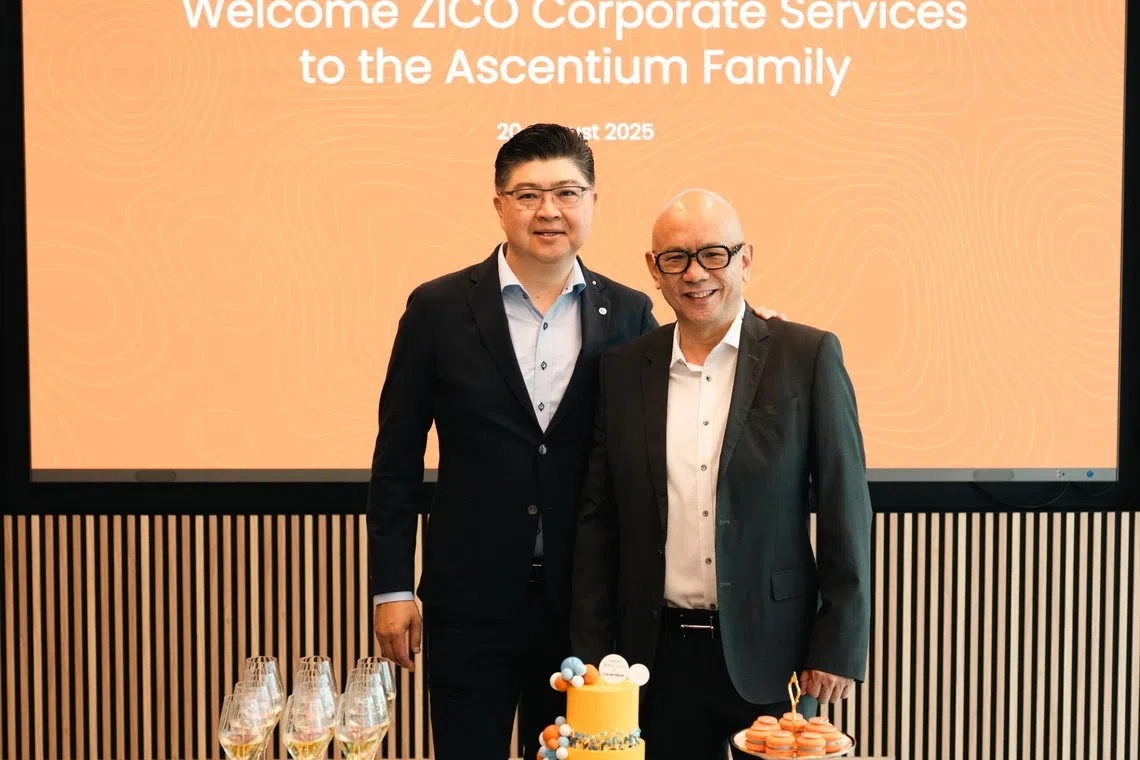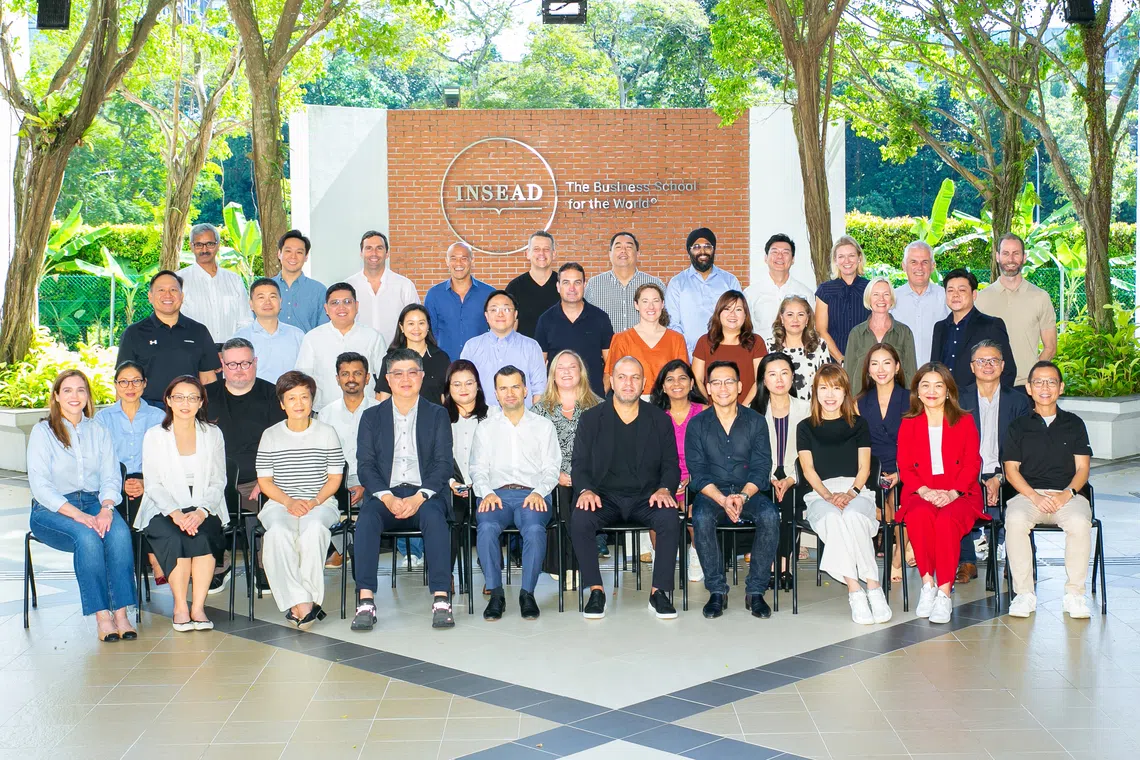Local insights, targeted support: How this firm can help businesses scale in Asia thanks to co-founder’s mission
Founded in 2024 in Singapore by chartered accountant Lennard Yong, Ascentium, which has grown to $200 million in revenue, supports Fortune 500 companies in their regional expansion
From Penang to Australia, Europe, Hong Kong and now Singapore, Lennard Yong’s path was anything but linear. Each city where he worked has added a layer to the financial services veteran-turned-entrepreneur’s perspective, deepening his understanding of corporate compliance, markets and regulations.
Born in Penang and raised in Kuala Lumpur, Yong moved to Australia in his teens before launching a global career that covered banking and insurance in Australia, Hong Kong and Europe, and now includes a joint venture with a private equity firm. These experiences sharpened his grasp of how businesses operate across borders and foster sustainable, long-term value creation – an insight he carried with him when he eventually put down roots in Singapore last year.
It was here, in 2024, that Yong co-founded Ascentium with Wendy Wang, a trusted leadership peer from his previous ventures. “I wanted to build a company that’s ahead of the curve, helping Fortune 500 clients across Asia Pacific and the Middle East adapt to a new world,” he says.
“Asia needs its own corporate services champion,” Yong says. “Multinational headquarters are shifting eastward to Singapore, Hong Kong and Dubai. At the same time, Chinese, Indian and South-east Asian companies are expanding globally. Both trends demand corporate service providers with deep local expertise that can accelerate commerce and trade.”
Identifying gaps and opportunities arising from Asia’s growing prominence as a business hub in today’s multi-polar world, Ascentium positions itself as a forward-thinking player.
Over the past year, the company has expanded rapidly through strategic acquisitions. Unlike many large corporate services companies, however, Ascentium deliberately partners with agile, founder-led businesses run by entrepreneurial executives who are willing to co-invest. Many of Ascentium’s senior hires embrace this model, underscoring their belief in the company’s vision.
Navigate Asia in
a new global order
Get the insights delivered to your inbox.
To reinforce this alignment, Ascentium also invites senior leaders from acquired firms to become equity co-investors. This model reflects its entrepreneurial mindset, fosters ownership and long-term commitment and ensures leadership incentives are directly tied to business performance. The result is a network of highly engaged leaders deeply invested in the company’s shared success.
Yong notes this approach not only accelerates integration but also preserves the local expertise and client relationships that are often lost in traditional mergers and acquisitions deals. Beyond building scale, Ascentium’s acquisition strategy is designed to stack both talent and capabilities, resulting in a comprehensive suite of services that encompasses corporate secretarial, payroll, fund administration, governance, compliance and cross-border advisory.
Opportunities in a multi-polar world
Yong’s decision to base Ascentium in Singapore was shaped in part by veteran Singaporean diplomat Kishore Mahbubani, whose writings argue that the world is moving away from Western dominance toward a multi-civilisational, multi-polar and multi-lateral order.
He says this trend has created alternatives to traditional financial hubs like New York and London. Before establishing Ascentium in Singapore, Yong declined another approach to become a co-investor and chief executive officer (CEO) for a sponsor-led corporate service firm anchored and headquartered in London.
“You must follow your convictions, and I want to be where tomorrow’s leaders will be,” he notes. In their place, Asian hubs such as Singapore, Hong Kong, Tokyo, Mumbai, Riyadh and Dubai are increasingly playing a central role in decision-making.
Among these rising centres, Singapore stood out as the natural choice for Ascentium’s headquarters, thanks to its pro-business environment, strategic location and the fact that its first acquisition, InCorp Global, is based in the city-state.
“As Professor Mahbubani has said, in many public forums, we are entering the end of a unipolar world and moving into a multi-polar world,” Yong adds. He translates this insight into his business context: The opportunity is ripe for Asia’s enterprises to be more assertive in their global leadership, to set up their own rules, define their own key performance indicators and to play to their strengths.
Anchored in Singapore, Ascentium is well-equipped to do just that, drawing on its deep understanding of local markets to play to its strengths. Citing Indonesia as an example, Yong explains that foreign companies often misinterpret local tax and employment regulations when entering the market.
“Regulatory frameworks across Asia require careful navigation and established relationships,” he says. “These nuances simply don’t exist in more Western-oriented jurisdictions – that’s where we come in.”
This regional grounding is especially important given Ascentium’s client base, which includes Chinese and Indian companies expanding into South-east Asia, Singapore-based firms going global and family offices seeking support across a wide spectrum of backend operations.
These clients require more than just transactional services – they need partners who understand the intricacies of local regulations, cultural expectations and operational challenges. Ascentium’s model, built on deep in-market knowledge and entrepreneurial leadership, is tailored to meet these demands with precision and agility.
Growth through strategic investments
Ascentium is growing at pace, with 10 acquisitions to date and a strong expansion push across South-east Asia.
Most recently, the firm acquired Singapore-listed Zico Holdings’ corporate services businesses in Singapore, Malaysia and the Philippines. This acquisition also marked Ascentium’s entry into the Labuan market, an emerging offshore financial centre off the coast of Sabah.

However, Yong adds that acquisitions are only part of the overall strategy. The company has invested significantly in technology and talent development to empower its people. For instance, it partnered with Insead to accelerate the growth of its C-suite through a customised programme at the Insead Asia Campus in Singapore. Designed with Professor Philip Meyer-Doyle, the programme delivered just-in-time learning, equipping Ascentium’s leaders with private equity expertise and the tools to drive successful value-creation initiatives.
While leadership development programmes are not uncommon, what sets this initiative apart is the company’s stage of maturity. At just 18 months old – when most firms are still focused on basic team building – Yong is already prioritising executive-level development. This forward-looking approach was underscored at the memorandum of understanding signing ceremony attended by Professor Sameer Hasjia, dean of Asia Campus and dean of Executive Education at Insead.

With more than 2,300 professionals serving 50,000 client entities across 23 markets, Ascentium is positioning itself as more than a service provider. “Our track record speaks through our professionals, our investors and our clients; they’re all choosing to grow with us,” he notes.
Drawing on local insight, bold acquisitions and a multi-polar worldview, Yong sees Ascentium as a catalyst for the next era of global business where Asia plays a central role in decision-making.
Visit the Ascentium website for more information about its corporate services.

Decoding Asia newsletter: your guide to navigating Asia in a new global order. Sign up here to get Decoding Asia newsletter. Delivered to your inbox. Free.
Copyright SPH Media. All rights reserved.
